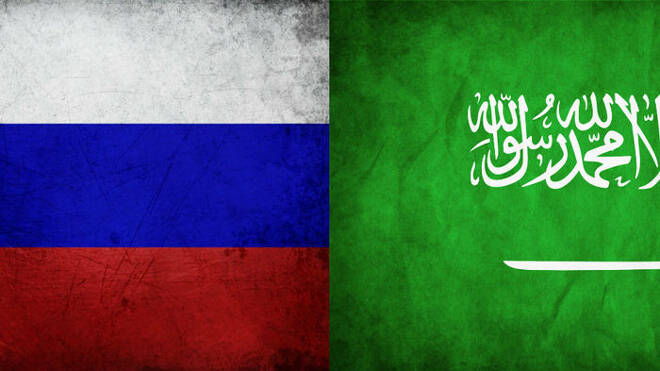Advertisement
Advertisement
Russia & Saudi Arabia Find Common Ground – OPEC Has No Choice But To Follow
By:
Crude oil gained another 2.5% in Monday’s holiday session. The US was closed for the Labor Day holiday and most world leaders were in China for the G20
Crude oil gained another 2.5% in Monday’s holiday session. The US was closed for the Labor Day holiday and most world leaders were in China for the G20 Summit. Crude oil gained over $1 to trade at 45.19 while climbed to 47.41 as traders rallied on comments from Russia and Saudi Arabia. The OPEC giant is reportedly going to make a statement alongside Russia – the largest producer outside the cartel – at the G20 meeting in China. Reuters reported that it would be a joint statement with Russia calling for “cooperation to support oil markets”. Prices first started rising after a press agency representing the Saudis said a “significant announcement” related to the energy sector would be delivered by oil minister Khalid al-Falih later on Monday. Today, crude oil is trading at $44.88 down 0.34% while Brent oil is trading at $47.16 down 0.54%.
It seems now that both countries are looking to privatize their oil interests that they also have a common goal. The cartel is scheduled to officially meet in Vienna in November. Russia will likely send a delegation to November’s OPEC meeting, Reuters said citing a source with knowledge of the matter.
Despite promise of a “significant” announcement — leading to a 5.5 percent jump in oil prices — no concrete actions were revealed at the joint press briefing in Hangzhou. Al-Falih denied there was any current need to cap production, saying “markets are trending in the right direction.”
While Russian-Saudi cooperation is yet to yield firm steps toward steadying the market, a joint press conference between the two oil giants is rare. It shows a growing trust and understanding that collaboration is vital to oil’s recovery, the ministers said.
In a joint statement, the two countries confirmed they’ll hold further talks during the International Energy Forum in Algiers this month.
Several OPEC countries voiced their support for the Russian-Saudi pledge to cooperate. The oil ministers of the United Arab Emirates, Kuwait and Qatar welcomed the joint statement, while Algerian Energy Minister Bouterfa said it shows producers must reach an accord on output.
“Oil below $50 is not acceptable,” Bouterfa said. “Countries need income to invest, to develop production and industries.”
Putin has said oil producers now recognize that Iran, which has mostly restored the output halted during three years of trade restrictions, deserves to complete its return to world markets.
Iran showed Monday that it’s ready to pump more crude, with state-run National Iranian Oil Co. saying the country can raise production to 4 million barrels a day in two to three months from the current daily level of about 3.8 million. Iran still isn’t likely to accept a cap while neighbor Iraq and arch-rival Saudi Arabia continue to boost supply. But its grounds for opposition are diminished. It’s determined to get to 4 million barrels a day by the end of September. And if its production reaches a point where it can’t be raised further without significant investment and a long lead-time it might, just might, agree to a freeze to call the Saudis’ bluff. So Iraq is the most probable holdout.
Nigeria, too, will balk at freezing production at its current level, which has fallen by about 500,000 barrels since January because of sabotage in the Niger River delta region. A temporary ceasefire by the Niger Delta Avengers militant group, who claim responsibility for most attacks, could let companies restore some of that production.
Russia, an architect of the April gathering, also seems wary of risking a repeat of the embarrassment inflicted by the Saudis last time. So it will play its cards carefully. This won’t stop others in OPEC from continuing to promote the idea of a freeze. Nor will it prevent the oil price from jumping on every hint of a deal — no matter how absurd.
About the Author
Barry Normanauthor
Advertisement
